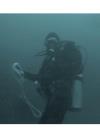
|
Well for starters, welcome to the pool.
First step is to look around DiveBuddy for all of the gems Greg buried here like up on the top toolbar where it says "Calculators", in there you will find a check list to get the proper weighting.
|
|

|
thanks, I’ve not had a chance to look around the site yet, so I didn’t know that was there.
|
|

|
Greg - 4/29/2013 6:45 PM 
|
|

|
Do a weight check with the same type tank you will be diving with only 500psi in the tank adjust your weight so with your lungs full you float at eye level. When you exhale you should sink. You do this check any time you significantly change your equipment (tanks type/size or exposure protection) or the water salinity. (going from fresh to salt water or even different salt levels such as the Dead Sea) This is the only way to correctly find your needed weights. From that point you need to select where to stow them to set your trim so you can swim and float correctly and comfortably. Buoyancy and/or weight calculators just give you a starting point!
|
|

|
Since it sounds like you’ll be joining others on a boat, this is what I suggest: when you arrive at the dive site, put on all your gear, except for the fins, and wade out from the beach with your partner to about shoulder depth. Standing straight up and looking toward the shore or your partner, pump a little air into your BC. Next, hold your breath and allow your knees to bend until your lower legs are at a 90 degree angle, then try floating without moving at all. After a few seconds, see if you float until your eye level breaks the surface, then exhale slightly. You should sink a little. Then as you take a breath, you should float a little. At that point, begin breathing normally with your feet off the bottom and make buoyancy adjustments. You should be able to remain motionless underwater, floating slightly when you inhale, and sinking a little when you exhale. Make sure your partner is standing close to you in case you get too nervous.
Good luck, and stay safe!
|
|

|
hi everyone,
thanks for all the advice, i was going to take another dive class before the trip, but living in east tn, noone is doing them until june.
this will be on a class trip that has been set up by the instructor through my college, and we will be using octoal diving in costa rica, and i will be renting all my equipment from them, so i don’t know what kind of stuff i will have. is it mandatory to do a weight check at the beginning of the dive so i can figure this out before taking off on the boat?
thanks again.
|
|

|
It would be less stressful for you to get all the weight and buoyancy issues out of the way while still on the shore and before getting on the boat for the deeper dive UNLESS the boat has some sort of submersible platform that you can stand on while in the deep water. If that’s the case, then wait until you’re on the boat and ready to dive.
|
|

|
Greg - 4/30/2013 1:59 PM 
From easttngirl33: is it mandatory to do a weight check at the beginning of the dive so i can figure this out before taking off on the boat?
Depends on the type of dive. If it’s a training dive for newer divers, they may do this. If it’s for advanced training or pleasure, they won’t require a weight check. But don’t feel bad if you have to hold the boat up for 5 mins while you do a weight check. And as you start your dive, if you feel you need more weight, holler to the divemaster/instructor to help you out. They should be able to bring you a couple extra pounds so you don’t need to get back out of the water.
|
|

|
The 500 psi is a great idea I say that because as i was doing my check out dive we were in about 45 ft of water and as the tank went from 3000 to 1500 +/- I shot up and out of the water like a torpedo was not a good thing thank god it was only 40 + feet so if anything take on a few more lb then you think to be safe .I also found that I can only use steal tanks do to the rapid change of aluminum tanks .
|
|

|
If diving from a boat, tell the divemaster you are going to do a weight check at the beginning of the first dive. Most divemasters can give you a pretty good approximation of how much weight you will need. Then, don’t hang back. Be the first one into the water. You may have made any needed adjustments by the time all the other divers are in the water and ready to go. There will likely be other divers making last minute weight checks/adjustments, too.
|
|

|
"i’m worried i’m going to do something stupid and ruin it for everyone on the boat."
I really don’t have anything to add to the weight discussion - everyone here’s pretty much covered what you need to know. But if this is your first boat dive, you may want to check out the "ScubaSnobs Guide to Diving Etiquette" (http://scubasnobs.com/wordpress_2/?page23). While their books are a humorous look at diving, they actually contain quite a few gems about diving in general and how to behave on a boat in particular. As long as you remember the kernal of the rule, you’ll be in good shape.
And when all else fails, be up front about the fact that you’re a newbie and want to learn from others that are more experienced. Good hearted enthusiasm will often trump lack of knowledge!
Have a great time! The diving should be awesome!
|
|

|
Welcome to the forum and put your anxieties aside and do what you were taught in class and buddy up with somebody that has some experience. They will take you under their wing and get you comfy in no time. Enjoy the dive.
|
|

|
From Diver38: The 500 psi is a great idea I say that because as i was doing my check out dive we were in about 45 ft of water and as the tank went from 3000 to 1500 +/- I shot up and out of the water like a torpedo was not a good thing thank god it was only 40 + feet so if anything take on a few more lb then you think to be safe .I also found that I can only use steal tanks do to the rapid change of aluminum tanks .
If you set your weight with the 500 psi in your tank it will not matter what tank you use as long as it the same you dive with. You will not shoot to the surface at the end of the dive if you empty you BCD and/or Drysuit. This is due to the pressure at safety stop depth compressing all the buoyant material you bring down with you from the surface. (swimsuit, BCD, safety sausage, exposure protection) This effect is more pronounced with greater amounts of materials such as thicker wetsuits. This means if you set your buoyancy neutral before you started the dive as I described that at 10’ of depth at the end of your dive you will be slightly negatively buoyant and need to swim to the surface. This check should not be done in shallow water it must be done in water deep enough to allow you to relax your body so your arms and legs are dangling and fins do not hit bottom.
I would agree that if you can’t do a check before boarding to get in the water early and have an instructor or divemaster help you weight. Remember the exhale at the surface it is important to do it completely and give yourself time to sink (without kicking) once you get a few feet under pressure helps you to descend. Do not let them start you heavier than needed. This makes things easier on them but doesn’t factor well for you as a diver. It is best to use the minimum amount of weight necessary to maintain your safety stop depth at the end of the dive. (down to 500 psi) Since this is the minimum you should ever surface with in your tank and once you do surface you will not descend again. 500 psi is a safety to insure proper regulator function and your surface reserve for keeping your BCD inflated.
|
|

|
After checking weight. During the dive check your tank pressure. I find it helpful to adjust my BCD around 1000 psi before I get too positive buoyant. You will find that in warm water with just a dive skin, that you will have much better control then in cold fresh water. At least it seems that way to me.
Try to relax enjoy the dive.
good lick
john
|
|

|
Pixel - 5/12/2013 11:01 AM 
I never got all the tech weight stuff talk when I started. I got told rule of thumb: 10% of your body weight + 2kg if you’re wearing a 7mm semi-dry. (I’m sure many of the instructors/dm’s etc on this forum are now horrified) And of course the one where you get in the water with weight, float, and then throw whatever you don’t need back on the boat.
A good tip also: take a shopping bag down with you. If you find you can get down, but then don’t stay down due to not enough weight, you simply fill the shopping bag with sand and tie it on your weight belt. (that comes out of an instructors mouth, who on a dive ended up giving all his weights to students and was left with bags and rocks he found)
|
|